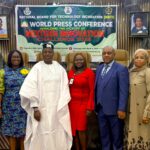By Rukayat Moisemhe
Mr Hakeem Ogunniran, a thought leader in real estate, has projected Africa’s real estate market potential to reach $17.64 trillion by 2025.
Ogunniran said this at the Nigerian-British Chamber of Commerce (NBCC) Real Estate Summit on Friday in Lagos.
The summit, with the theme, “The Future of Real Estate: Floating Cities, Skyscrapers & Tech-Driven Living,” explored innovations shaping the industry.
The Eximia founder highlighted that the residential segment alone was valued at $14.87 trillion, with a projected annual growth rate of 5.58 per cent from 2024 to 2029.
According to Ogunniran, Nigeria’s real estate sector presents enormous opportunities, estimating its market value at $2.61 trillion in 2025, with residential real estate accounting for approximately $2.5 trillion.
He identified key drivers shaping the future of Nigeria’s real estate sector, including, strong compliance and regulatory frameworks, adoption of property technology and digital transformation.
Others are, sustainability and green building practices, integrated urban planning, innovative financial solutions, and affordability and accessibility.
To maximise these opportunities, he urged Nigeria to stay ahead of industry shifts and leverage emerging trends in housing and construction.
Ogunniran pointed out potential areas for investment to include, student hostel, accommodation, card homes, co-living and co-working spaces and crowdfunding in real estate.
Also listed are, logistics warehouses and data centres, digitised real estate assets, and neighbourhood retail centres.
“The key pillars of a modern real estate framework are livability, sustainability, resilience, and affordability,” he said.
Mr Akin Opatola, President of the International Real Estate Federation (FIABCI Nigeria), stressed the need for innovation to address Nigeria’s evolving real estate landscape.
He advocated for exploring floating cities and skyscrapers as solutions to land shortages and climate risks.
“The future of real estate development requires professionals to embrace blockchain for property transactions, AI-driven property management, and public-private partnerships,” Opatola said.
Mrs Udo Okonjo, CEO of Fine & Country West Africa, highlighted the importance of long-term sustainable development.
She emphasised that floating cities could be resilient to flooding, space-efficient with vertical density, and incorporate smart infrastructure to drive sustainability and innovation.
Mr Ray Atelly, President of the NBCC, noted that the real estate and construction sectors were at a critical turning point, driven by rapid urbanisation, climate adaptation, and technological advancements.
He highlighted how the industry is shifting towards vertical megacities, floating urban centres to combat rising sea levels and tech-driven and sustainable living solutions.
“The summit is a call to action for stakeholders in construction, real estate, and urban planning to rethink traditional development models,” Atelly said.
“Nigeria, as Africa’s largest economy, has the potential to lead the way in shaping future-forward cities that are smart, resilient, and inclusive.”
He, however, emphasised the need to tackle challenges such as infrastructural deficits, sustainability concerns, and technology adoption.
“The time is now to reimagine how we build, innovate, and create spaces that serve both present and future generations,” Atelly added. (NAN)(www.nannews.ng)
Edited by Kevin Okunzuwa













This is so detailed and practical